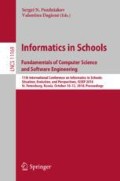Abstract
In the last two decades, educators have been following the terminology of Computational Thinking first posed by Wing. Different viewpoints and commentaries have been adopted, and accordingly course syllabi and learning materials were developed, particularly for K-12. The field has become a mandatory part of the curriculum in various countries, even for preschool age. The paper presents an academic course for pre-service teachers with the main aim to facilitate and instruct students in the process of building their understanding and interpretation of Computational Thinking, in the context of teaching their own discipline. The course pedagogical approach emphasizes the adoption of Computational Thinking while identifying significant, non-trivial, computational processes in different disciplines. The course model was implemented with three pre-service teacher populations studying for their teaching certificate in: (1) sciences for high school; (2) humanities and social sciences for high school; and (3) various disciplines for elementary school. The course allows future teachers to experience for themselves learning activities that are recommended for implementation with their future students. The course pedagogical approach and rationale are presented, followed by detailed course structure and learning assignments. The teaching, learning, and assessment approach yielded impressive achievements, although not without obstacles and difficulties. The details of the course presentation enable its implementation with different populations of pre-service and in-service teachers, and can also be implemented in schools.
Access this chapter
Tax calculation will be finalised at checkout
Purchases are for personal use only
References
Barr, D., Harrison, J., Conery, L.: Computational Thinking: a digital age skill for everyone. Learn. Lead. Technol. 3–4(2011), 2–23 (2011)
Brennan, K., Resnick, M.: New frameworks for studying and assessing the development of computational thinking. Paper presentation at AERA 2012 (2012)
Csizmadia, A., et al.: Computational thinking: a guide for teachers. Comput. Sch. Community 1–18 (2015). https://community.computingatschool.org.uk/files/6695/original.pdf
Computing at schools web site. Material on Computational Thinking and related topics. http://community.computingatschool.org.uk/resources/252
Computer Science Teachers Association (CSTA): Operational definition of Computational Thinking for K–12 education – Flayer (2011). http://www.iste.org/docs/ct-documents/computational-thinking-operational-definition-flyer.pdf?sfvrsn=2
Computer Science Teachers Association (CSTA) and the International Society for Technology in Education (ISTE): Computational Thinking in K–12 education leadership toolkit (2011). https://c.ymcdn.com/sites/www.csteachers.org/resource/resmgr/471.11CTLeadershiptToolkit-S.pdf
Cuny, J., Snyder, L., Wing, J.M.: Demystifying computational thinking for noncomputer scientists. Unpublished manuscript (2010). http://www.cs.cmu.edu/~CompThink/resources/TheLinkWing.Pdf. Key: citeulike:13256108
Denning, P.J.: The profession of IT beyond computational thinking. Commun. ACM 52(6), 28–30 (2009)
Duncan, C., Bell, T., Atlas, J.: What do the teachers think?: introducing computational thinking in the primary school curriculum. In: Proceedings of the Nineteenth Australasian Computing Education Conference (ACE 2017), pp. 65–74 (2017)
Google: Computational Thinking for Educators course. https://computationalthinkingcourse.withgoogle.com/course?use_last_location=true
Hodhod, R., Khan, S., Kurt-Peker, Y., Ray, L.: Training teachers to integrate Computational Thinking into K-12 teaching. In Proceedings of the 47th ACM Technical Symposium on Computing Science Education (SIGCSE 2016), pp. 156–157 (2016)
Hu, C.: Computational thinking: what it might mean and what we might do about it. In: Proceedings of the 16th Annual Joint Conference on Innovation and Technology in Computer Science Education (ITiCSE 2011), pp. 223–227 (2011)
Lye, S.Y., Ling Koh, J.H.: Review on teaching and learning of computational thinking through programming: what is next for K-12? Comput. Hum. Behav. 41, 51–61 (2014)
Lodi, M.: Growth Mindset in Computational Thinking teaching and teacher training. In: Proceedings of the 2017 ACM Conference on International Computing Education Research (ICER 2017), pp. 281–282 (2017)
Mishra, P., Koehler, M.J.: Technological pedagogical content knowledge: a framework for teacher knowledge. Teach. Coll. Rec. 108(6), 1017–1054 (2006)
MIT Media Lab: Scratch – a free visual programming language. https://scratch.mit.edu/about/
Sabitzer, B., Antonitsch, P.K., Pasterk, S.: Informatics concepts for primary education: Preparing children for computational thinking. In: Proceedings of the 9th Workshop in Primary and Secondary Computing Education (WiPSCE 2014), pp. 108–111 (2014)
Shulman, L.S.: Those who understand: Knowledge growth in teaching. Educ. Res. 15(2), 4–14 (1986)
Wing, J.M.: Computational thinking. Commun. ACM 49(3), 33–35 (2006)
Wing, J.M.: Computational Thinking: What and Why? The Magazine of Carnegie Mellon University’s School of Computer Science (2011). https://www.cs.cmu.edu/link/research-notebook-computational-thinking-what-and-why
Wing, J.M.: Computational Thinking Benefits Society, Social Issues in Computing. Academic Press Blog, New York (2014). http://socialissues.cs.toronto.edu/index.html%3Fp=279.html
Yadav, A., Stephenson, C., Hong, H.: Computational thinking for teacher education. Commun. ACM 60(4), 55–62 (2017)
Acknowledgments
We wish to acknowledge all the students who participated in the three courses. They are groundbreakers in being the first to experience that academic course. Students overcame their obstacles since they trusted the route before them, despite the “bumps” along the way.
Author information
Authors and Affiliations
Corresponding author
Editor information
Editors and Affiliations
Appendix
Appendix
1.1 Examples of Students’ Projects
Following some of the topics of CP that students addressed in their projects, is presented, to enable partial expression from students’ products.
-
Mathematics: The movement of ducks with and against the river current.
-
Physics: Throwing an object on a slope.
-
Chemistry: Simulation of splitting particles moving inside a container and colliding with the walls and themselves.
-
Computer Science: Simulation of the Dijkstra algorithm in Graph Theory.
-
Citizenship: Presenting alternatives to building a coalition based on the political platforms of parties.
-
Social Sciences: Making decisions about the location of a new school according to socio-economic, social, and infrastructure considerations.
-
Language: Root word recognition.
-
Literature: Identifying versification in songs.
-
Mathematics for Elementary School: Identifying common and diagnostic properties of the square family.
Rights and permissions
Copyright information
© 2018 Springer Nature Switzerland AG
About this paper
Cite this paper
Noa, R. (2018). Computational Thinking: Constructing the Perceptions of Pre-service Teachers from Various Disciplines. In: Pozdniakov, S., Dagienė, V. (eds) Informatics in Schools. Fundamentals of Computer Science and Software Engineering. ISSEP 2018. Lecture Notes in Computer Science(), vol 11169. Springer, Cham. https://doi.org/10.1007/978-3-030-02750-6_13
Download citation
DOI: https://doi.org/10.1007/978-3-030-02750-6_13
Published:
Publisher Name: Springer, Cham
Print ISBN: 978-3-030-02749-0
Online ISBN: 978-3-030-02750-6
eBook Packages: Computer ScienceComputer Science (R0)

